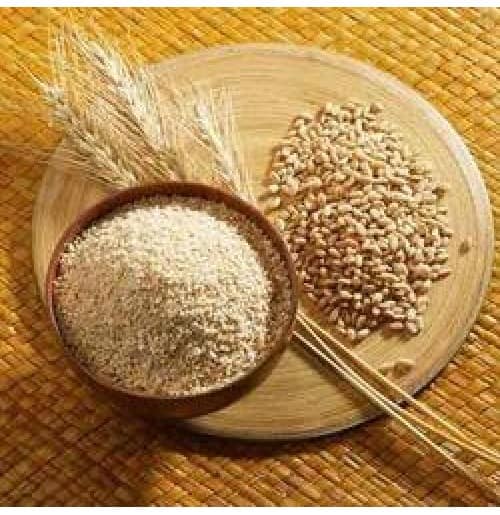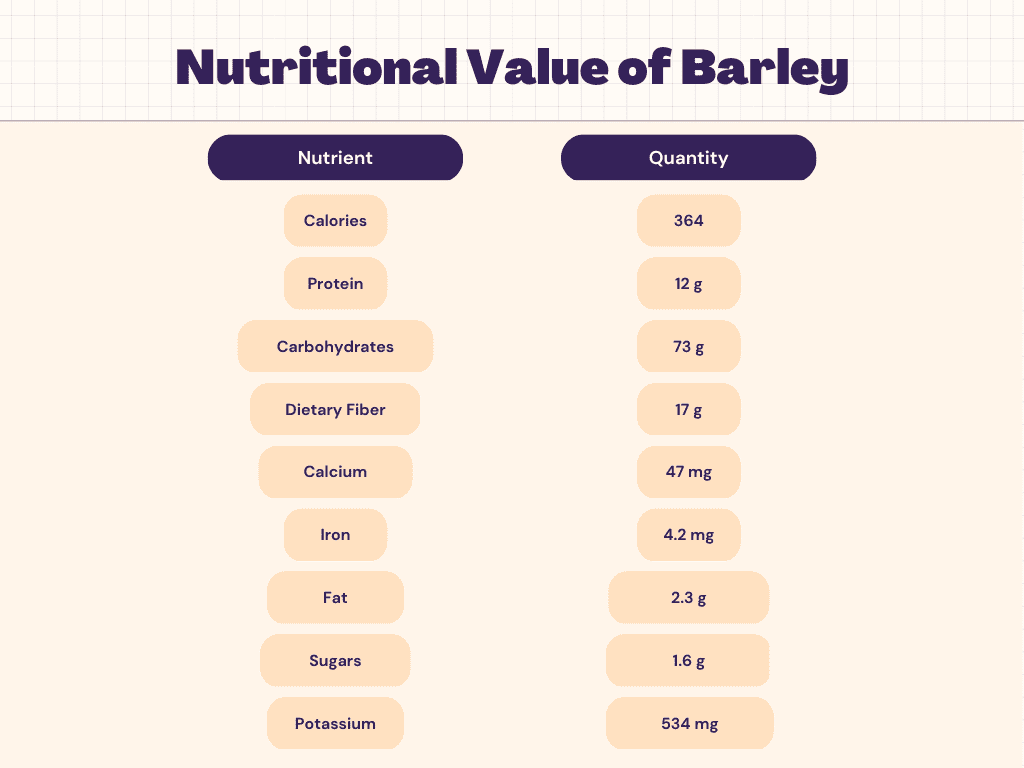Barley is a cereal grain that has been consumed for thousands of years and is considered one of the oldest and most nutritious grains in the world. It is a staple food in many cultures and offers a wide range of health benefits, making it an excellent addition to a balanced and nutritious diet. In terms of nutrition, barley is low in calories and high in fiber, making it a great food for weight management. It is also a good source of protein, carbohydrates, vitamins, and minerals, providing the body with essential nutrients to support overall health and wellness. In this article, we will explore the nutritional value of barley, including its calorie content, protein, and carbohydrates.
Nutritional Value of Barley
Nutritional Facts of Barley
Carbs In Barley
Barley is a significant source of carbohydrates, with 100 g of barley providing about 73 g of total carbohydrates. The majority of the carbohydrates in barley are complex carbohydrates, which are a slow-digesting and sustained source of energy for the body. These complex carbohydrates are also a good source of fiber, providing about 17 g per 100 g of barley. The fiber in barley can help regulate digestion and improve overall gut health, as well as support weight management by helping to control hunger and reduce the total number of calories consumed. Additionally, the fiber in barley can also help lower cholesterol levels, reduce the risk of heart disease, and improve glucose control in people with diabetes.
Protein In Barley
Barley is a good source of protein, with 100 g of barley providing about 12 g of protein. Protein is an essential nutrient that is important for building and repairing tissues, as well as for supporting healthy skin, hair, and nails. Protein is also necessary for producing enzymes, hormones, and other substances that are essential for good health. Consuming enough protein is especially important for athletes, bodybuilders, and people who engage in regular exercise, as protein is needed to help repair and rebuild muscle tissues that may be damaged during physical activity. Additionally, protein in barley can help control hunger and keep you feeling full for longer, making it a great food for weight management.
Health Benefits Of Barley
Barley offers several health benefits for people with Polycystic Ovary Syndrome (PCOS), diabetes, thyroid problems, and those looking to lose weight. Some of these benefits include:
- Supports blood sugar control: Barley is a low glycemic index food, meaning that it is slowly absorbed and metabolized by the body, leading to a gradual and sustained release of glucose into the bloodstream. This helps regulate blood sugar levels and reduces the risk of type 2 diabetes. Check our Diabetes Plans here.
- Supports weight loss: Barley is a high-fiber food, with 100 g of barley providing about 17 g of fiber. Fiber helps regulate digestion, improves satiety, and reduces overall calorie intake, making it a great food for weight management. Check our Weight Loss Plans here.
- Supports thyroid health: Barley is a good source of selenium, a mineral that is essential for thyroid health. Selenium helps the thyroid produce hormones that regulate metabolism and energy levels. Check our Thyroid Plans here.
- Reduces inflammation: Barley is a rich source of antioxidants, which help reduce inflammation and protect the body from oxidative stress for PCOS. Check our PCOS Plans here.
Vitamins & Minerals in Barley
Barley is a nutritious grain that is rich in vitamins and minerals, making it a great addition to a balanced and healthy diet. Some of the key vitamins and minerals found in barley include:
- Fiber: Barley is a good source of fiber, with 100 g of barley providing about 17 g of fiber. Fiber helps regulate digestion, improve satiety, and reduce overall calorie intake, making it a great food for weight management.
- Magnesium: Barley is a rich source of magnesium, with 100 g of barley providing about 116 mg of magnesium. Magnesium is essential for heart health, healthy bones, and supporting a healthy immune system.
- Manganese: Barley is a good source of manganese, with 100 g of barley providing about 1.3 mg of manganese. Manganese is important for healthy bones, skin, and connective tissue.
- Phosphorus: Barley is a rich source of phosphorus, with 100 g of barley providing about 180 mg of phosphorus. Phosphorus is essential for strong bones, and teeth, and for supporting a healthy metabolism.
- Niacin (Vitamin B3): Barley is a good source of niacin, with 100 g of barley providing about 3.5 mg of niacin. Niacin is essential for healthy skin, nerves, and digestion.
These are just a few of the key vitamins and minerals found in barley. It’s important to note that while barley can provide health benefits, it should be consumed as part of a balanced and nutritious diet, along with the regular physical activity.
The Bottom Line
Barley is a nutritious grain that is rich in fiber, magnesium, manganese, phosphorus, and niacin (vitamin B3). It is a great food for weight management, heart health, healthy bones, and immune system support. However, it is important to note that barley should be consumed as part of a balanced and nutritious diet, along with the regular physical activity. The key vitamins and minerals found in barley include fiber, magnesium, manganese, phosphorus, and niacin.
Faqs
How much Barley can I eat in a day?
The recommended daily intake of barley can vary depending on individual factors such as age, gender, weight, and activity level. However, as a general guideline, the American Heart Association recommends eating whole grains, including barley, in moderation as part of a healthy diet.
It is recommended to consume at least three 1-ounce servings (or about 48 grams) of whole grains per day for a healthy diet. This equates to approximately 144 grams of whole grains per day, including barley. However, this is a general guideline and individual needs may vary. It is always best to consult a healthcare professional or registered dietitian to determine the right amount of barley for your specific needs and dietary goals.
Should I eat Barley before or after exercise?
Barley can be consumed before or after exercise, depending on your individual needs and goals.
Consuming barley before exercise can provide you with sustained energy and help maintain stable blood sugar levels during your workout. This is especially true if you consume barley in the form of whole grains or high-fiber barley products, as the slow-digesting carbohydrates will help provide sustained energy.
On the other hand, eating barley after exercise can help replenish glycogen stores, which are depleted during exercise. This can help speed up recovery and reduce muscle soreness.
What are the benefits of Barley?
Barley provides a variety of health benefits, including:
- Rich in nutrients: Barley is a good source of fiber, vitamins, and minerals, including manganese, selenium, and magnesium.
- Supports digestion: Barley is high in fiber, which helps to support digestive health and prevent constipation.
- Helps regulate blood sugar: Barley’s low glycemic index and high fiber content make it a good option for people with diabetes, as it can help regulate blood sugar levels.
- May reduce heart disease risk: The fiber and antioxidants in barley have been linked to a reduced risk of heart disease.
- May promote weight loss: Barley’s fiber and protein content make it a filling food that can help promote weight loss.
- Good for skin: Barley is rich in vitamins and minerals that are important for skin health, including vitamins C and E, and selenium.
What is the best time to eat Barley?
There is no specific “best” time to eat barley, as it can be enjoyed as a part of a meal at any time of day. However, here are some suggestions for incorporating barley into your diet:
- Breakfast: Barley can be cooked and added to oatmeal or yogurt for a nutritious and filling breakfast.
- Lunch: Barley can be added to salads, soups, or stews for a satisfying lunch.
- Dinner: Barley can be used as a base for a grain bowl or as a side dish with roasted vegetables or grilled meats.
- Snacks: Barley can be popped like popcorn for a crunchy snack, or blended into a smoothie for a quick and easy snack.
Ultimately, the best time to eat barley will depend on your personal preferences and schedule. The important thing is to include it as part of a balanced diet and to meet your daily nutrient needs.










